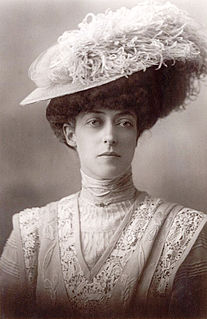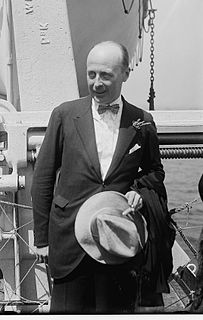
The Prisoner of Zenda (1894), by Anthony Hope, is an adventure novel in which the King of Ruritania is drugged on the eve of his coronation and thus is unable to attend the ceremony. Political forces within the realm are such that, in order for the king to retain the crown, his coronation must proceed. Fortuitously, an English gentleman on holiday in Ruritania who resembles the monarch is persuaded to act as his political decoy in an effort to save the unstable political situation of the interregnum.

Princess Margaret of Connaught was Crown Princess of Sweden and Duchess of Scania as the first wife of the future King Gustaf VI Adolf. She was the elder daughter of Prince Arthur, Duke of Connaught, third son of Queen Victoria of the United Kingdom, and his wife Princess Louise Margaret of Prussia. Known in Sweden as Margareta, she died 30 years before her husband's accession to the throne of Sweden.

Princess Mary Adelaide of Cambridge was a member of the British royal family, a granddaughter of George III, grandmother of Edward VIII and George VI and great-grandmother of Elizabeth II. She held the title of Duchess of Teck through marriage.

Princess Beatrice of the United Kingdom, was the fifth daughter and youngest child of Queen Victoria and Prince Albert. Beatrice was the last of Queen Victoria's children to die, 66 years after the first, her elder sister Alice.

Princess Victoria of the United Kingdom was the fourth child and second daughter of Edward VII and Alexandra of Denmark, and the younger sister of George V.

Since 1983, the crown of the Netherlands passes according to absolute primogeniture. From 1814 until 1887, a monarch could only be succeeded by their closest female relative if there were no eligible male relatives. Male-preference cognatic primogeniture was adopted in 1887, though abolished when absolute primogeniture was introduced in 1983. Proximity of blood has been taken into consideration since 1922, when the constitution was changed to limit the line of succession to three degrees of kinship from the current monarch.

The parentage of Queen Victoria has been the subject of speculation. The speculation has largely centered on the familial incidence of hereditary diseases and circumstantial evidence, and has generally been discredited.
A substantive title is a title of nobility or royalty acquired either by individual grant or inheritance. It is to be distinguished from a title shared among cadets, borne as a courtesy title by a peer's relatives, or acquired through marriage.

Isabella, Princess of Asturias was a Queen consort of Portugal and heir presumptive of King Ferdinand II of Aragon and Queen Isabella I of Castile, as their eldest daughter. Her younger siblings were Catherine, Queen of England, Queen Joanna I of Castile, Maria, Queen of Portugal, and John, Prince of Asturias.

Princess Elisa Radziwill was a member of Polish high nobility of royal ancestry. She was the desired bride of Prince William of Prussia, who later became William I, German Emperor, but they were not allowed to marry.

The Prisoner of Zenda is a 1979 American comedy film directed by Richard Quine and adapted from the adventure novel by Anthony Hope, first published in 1894. The novel tells the story of a man who has to impersonate a king, whom he happens to closely resemble, when the king is abducted by enemies on the eve of his coronation. An earlier adaptation of the story was made into a film in 1952 starring Deborah Kerr and Stewart Granger, and directed by Richard Thorpe.

The Prisoner of Zenda is a 1937 American black-and-white adventure film based on Anthony Hope's 1894 novel of the same name and the 1896 play.

The Prisoner of Zenda is a 1952 film version of the classic novel of the same name by Anthony Hope and a remake of the famous 1937 film version. This version was made by Loew's and Metro-Goldwyn-Mayer, directed by Richard Thorpe and produced by Pandro S. Berman.

Count Ingolf of Rosenborg is a former Danish prince. Born Prince Ingolf of Denmark, he appeared likely to some day become king until the constitution was changed in 1953 to allow females to inherit the crown, placing his branch of the dynasty behind that of his cousin Princess Margrethe and her two younger sisters. He later gave up his princely rank and his rights to the throne in order to marry a commoner. However, through his mother, he is a legitimate descendant of King George II of Great Britain, and retains a place in line to the British throne.

Prisoner of Zenda is an Australian 49-minute direct-to-video animated film from Burbank Films Australia. It was originally released in 1988. The film is based on Anthony Hope's classic English novel, The Prisoner of Zenda, first published in 1894, and was adapted by Leonard Lee. It was produced by Roz Phillips and featured original music by John Stuart. The copyright in this film is now owned by Pulse Distribution and Entertainment and administered by digital rights management firm NuTech Digital.

Prince Miguel of Braganza, Duke of Viseu was a member of the exiled branch of the House of Braganza. The eldest son of the Miguelist pretender to the throne of Portugal he married an American heiress in 1909 and in 1920 renounced his rights to the throne. His full given names were Miguel Maria Sebastião Maximiliano Rafael Gabriel Gonzaga Francisco D'Assis e de Paula Eustachio Carlos Afonso José Henrique Alberto Clemente lgnacio Martinho Antonio Gerardo Jorge Emmeric Mauricio.

Duchess Eilika of Oldenburg is the wife of Georg von Habsburg, the third in the line of succession to the former Austro-Hungarian throne. She was in line of succession to the British throne before her marriage to a Roman Catholic. She is a daughter of Duke Johann of Oldenburg and his wife Countess Ilka of Ortenburg. Her father is a younger son of Nikolaus, Hereditary Grand Duke of Oldenburg and his wife Princess Helena of Waldeck and Pyrmont.

Siaosi Manumataongo ʻAlaivahamamaʻo ʻAhoʻeitu Konstantin Tukuʻaho is the crown prince of Tonga. Tupoutoʻa ʻUlukalala became heir apparent to the throne in March 2012 upon the accession of his father, Tupou VI, as King of Tonga.




















